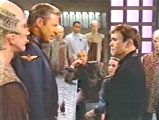

Contents: Overview - Backplot - Questions - Analysis - Notes - JMS
An addictive drug with telepathic effects is found on the station, prompting a visit by Bester. G'Kar reaches a turning point. Walter Koenig as Bester.
P5 Rating: 8.62 Production number: 306 Original air week: February 5, 1996 DVD release date: August 12, 2003 Written by J. Michael Straczynski Directed by David Eagle
'Course, whether or not one should *believe* anything he says is another question altogether.
It means we *forgot*. More correctly, *I* forgot. We were all so busy getting the new main titles done, we just kinda forgot about it until the first mix...and then we sorta looked around and said, "....oops."
At the start of every season, we have new people sampling the show. Do you want the show to continue? If you do, then you have to continue to add new viewers. If viewers tune in and they're lost in the overall arc, they're going to tune out again. So you give them some stand-alone episodes in the beginning, shows that are a little more accessible, but introduce them to the characters, the situations and the universe so that when the arc begins to move again, they know enough to get into what's going on.
Sure, I could've just kept going right with the strong arc episodes. Which the new viewers, 90% of whom sample shows in the first few weeks of a new season and not thereafter, wouldn't have been able to follow well. And they would've tuned out. And it would've been a very big nail in the cancellation coffin. You can bring in new viewers, or you can get canceled and never tell the whole story. Pick one.
Second, you cannot -- CANNOT -- sustain the kind of intensity you have in the final four over the course of a season. You need to have some lighter moments as contrast or people are going to start sticking their heads in ovens all across the country. So at the start of a season, I try to do some lighter stuff, to bring people back up a little, bracing for the next drop in the roller coaster. You need peaks and valleys to develop any kind of rhythm, or to appreciate the other side of it.
I got the same thing in season one, and season two..."Why these light episodes? What's happened to this arc?" Then by season's end, the chorus usually turns to "That was a GREAT season!" So my response is, Unless you think I've suddenly turned stupid, or I've decided to betray the series I've now worked 10 years of my life to produce...will you for chrissakes *trust* me once in a while? Show a little patience. When I introduced Vir, everybody on the planet jumped funky all over me. "He's just a comic character! It's Flounder! He's dumbing down the show! Space him! He stinks! Joe's losing it!" And now, of course, we see what Vir is, and in many surveys he's now one of the most popular characters.
You know what the #1 comment from the pilot was, on the nets and elsewhere? "LOSE the guy with the funny hair! He's just ridiculous." Londo. Every time I've done something a little different in the show, I've usually been jumped on, because they're not willing to trust that I know what I'm doing...until they've seen it for a while, then they Get It, and it's "Oh, now I see it." Great, thanks, now that you've been beating on my head for six months. Next time show a little patience. (And btw, ALL of the comments related above are real ones, many of them right here on Compuserve, from people still around here.)
Every story can't be an arc story at this point; you've got to see the characters outside the arc, in the way they live their lives, in other things that happen to them, or else you won't CARE what happens to them in the arc. No, the Purple/Green Drazi story didn't move the arc ahead, but it showed you a lot about Ivanova, didn't it? So now if and when something should happen to her in the arc, you care about her. It's the difference between just being chess pieces, and being *people*.
Okay, here's the breakdown. Season 3. You had arc episodes only a bit in the first batch. "Honor," "Voices" and now a little in "Dust." You've got one more stand-alone next week, "Exogenesis." That's the last one for a LONG time. Episodes 8, 9, 10, 11, 14, 15, 16, 17, 20, 21 and 22 are ALL arc stories, most of them heavy, none less than moderate.
I said, from the start, that each season would have stand-alones and arc stories. About 20% in year one, 35% in year two, 50% in year three, 70% in year four, and 100% in year five. And the stand-alones tend to get pushed toward the beginning of a season for the reasons stated. Is nobody paying attention when I say these things? Because if so, then why do I get gigged each season at the start by people saying "HEY! HOW COME THESE AREN'T ARC EPISODES?" (And as it looks now, year 3 has closer to 13-14 arc episodes, so we're ahead a bit.)
Before people start making sweeping generalizations about the season, it might behoove you to see the season first. If anything, my concern in looking at what's been done for year 3 is that we're too GRIM for the larger portion of it, and maybe a bit complex...so I'm working to clarify a few things here and there as I do these last few.
Re: the coat of welcoming...here's a little tidbit...we had to make up an entire alphabet for most of our major races (and I've been gradually building up a dictionary here and there for languages). So they came and asked if they could embroider something in Minbari on the shirt Vir's wearing when he comes back. I said sure. Did I have anything in mind? No, not really.
So I'm on the set that day, and I see the embroidered shirt, and I ask what these five letters spell, since I don't offhand read Minbari yet. He looked up at me and smiled. "It spells out ALOHA."
We have a very demented crew.
And I don't think the Narns have sacrificed nearly enough yet. You can always sacrifice more.
You just have to kinda put yourself out on a limb, as a writer or as an actor.
This scene *should* be very affecting. It goes to Joe's Theory of Violence on TV. To wit...that we need more of it, but it has to be realistic violence. It has to show consequences. You glorify or desensitize violence when you shoot somebody, and they just go down, no yelling in pain, no sobbing as their guts fall out onto the street. It's just gunfire, loud noises, excitement and fun. If you're going to show violence, then show it for what it *is*, and show it the way people would react to it. Make the audience understand that this is a *person*, not one in a series of body counts.
Yeah, everyone turned in great performances in this one, very intense and layered. And as a result of G'Kar's attack, the next several episodes will find him still in prison. In the B5 universe, you don't just go in for a long time at the end of an ep and next thing you're out again. He has to serve his time, and now we'll see him in a cell for a while.
And yes, you'll learn more about what happened to the Narn telepaths in coming months.